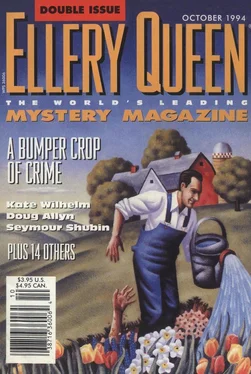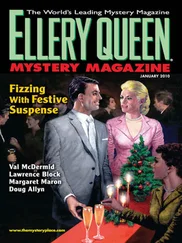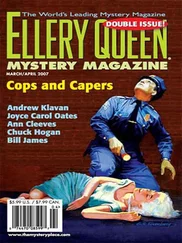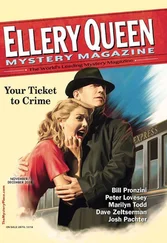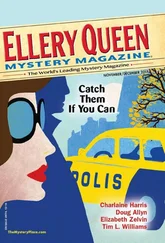Doug Allyn - Ellery Queen’s Mystery Magazine. Vol. 104, No. 4 & 5. Whole No. 633 & 634, October 1994
Здесь есть возможность читать онлайн «Doug Allyn - Ellery Queen’s Mystery Magazine. Vol. 104, No. 4 & 5. Whole No. 633 & 634, October 1994» весь текст электронной книги совершенно бесплатно (целиком полную версию без сокращений). В некоторых случаях можно слушать аудио, скачать через торрент в формате fb2 и присутствует краткое содержание. Город: New York, Год выпуска: 1994, ISBN: 1994, Издательство: Dell Magazines, Жанр: Детектив, на английском языке. Описание произведения, (предисловие) а так же отзывы посетителей доступны на портале библиотеки ЛибКат.
- Название:Ellery Queen’s Mystery Magazine. Vol. 104, No. 4 & 5. Whole No. 633 & 634, October 1994
- Автор:
- Издательство:Dell Magazines
- Жанр:
- Год:1994
- Город:New York
- ISBN:ISSN 1054-8122
- Рейтинг книги:4 / 5. Голосов: 1
-
Избранное:Добавить в избранное
- Отзывы:
-
Ваша оценка:
- 80
- 1
- 2
- 3
- 4
- 5
Ellery Queen’s Mystery Magazine. Vol. 104, No. 4 & 5. Whole No. 633 & 634, October 1994: краткое содержание, описание и аннотация
Предлагаем к чтению аннотацию, описание, краткое содержание или предисловие (зависит от того, что написал сам автор книги «Ellery Queen’s Mystery Magazine. Vol. 104, No. 4 & 5. Whole No. 633 & 634, October 1994»). Если вы не нашли необходимую информацию о книге — напишите в комментариях, мы постараемся отыскать её.
Ellery Queen’s Mystery Magazine. Vol. 104, No. 4 & 5. Whole No. 633 & 634, October 1994 — читать онлайн бесплатно полную книгу (весь текст) целиком
Ниже представлен текст книги, разбитый по страницам. Система сохранения места последней прочитанной страницы, позволяет с удобством читать онлайн бесплатно книгу «Ellery Queen’s Mystery Magazine. Vol. 104, No. 4 & 5. Whole No. 633 & 634, October 1994», без необходимости каждый раз заново искать на чём Вы остановились. Поставьте закладку, и сможете в любой момент перейти на страницу, на которой закончили чтение.
Интервал:
Закладка:
“Beg yours, mem?”
Mrs. Clayton’s laughter this time was merely exasperated. “Alec would clip him over the ear often as not, call him a ‘bloody Chink spy.’ I can’t say I completely blame him.” Mrs. Clayton’s smile reflected satisfaction, or an affectionate malice, as she imagined the effort the man behind them was making to keep his face expressionless. She and Cookie had been playing this game for years. She lifted the lid of the ice bucket on the folding table. “I think we could do with a refill, Cookie.”
“Yes, mem.”
As Cookie took the bucket back to the flat, Helen was not tempted to protest at the way Mrs. Clayton ordered him about, even though he was not her servant. As a newcomer to Singapore, Helen was not ready to challenge Mrs. Clayton’s belief that only the English knew how to cope with the problems of living in what, several years after national independence, the old woman still called “this colony.” And Mrs. Clayton was in many ways a friendly, helpful neighbour. For one thing, she had arranged for Cookie and Amah to stay on with the flat.
Cookie looked about forty, but Helen was sure he was considerably older, though perhaps not so old as his wife, who must be nearly sixty. She was skinny and ugly and quiet. Cookie’s face was smooth and chubby and rarely without a smile. His short, sturdy body, with the white cotton trousers flapping around the bare ankles of his bandy legs, seemed to vibrate with eagerness to please as he prepared meals and bossed his wife over the cleaning jobs.
Helen felt it was wrong to address the couple by their occupations rather than their names (which she had difficulty remembering, anyway), but Mrs. Clayton assured her that they had always been known as Cookie and Amah; a change, no matter how well intended, would only upset them.
Now, sipping her gin and tonic, Mrs. Clayton said, “You really couldn’t ask for a better servant than Cookie, though he does need to be kept up to the mark in matters of detail. Like making sure we have enough ice.”
“I suppose so.” Helen was careful not to show the slight irritation she felt. “But most of the time things seem to run smoothly enough, if I leave him to his own devices.”
“Oh, he’s a treasure in many ways, there’s no denying that.” Mrs. Clayton signalled the end of the discussion by doing up the top button of her cardigan and saying, “Quite a nip in the air this evening.” She looked at the dull glow of barely suppressed sweat on her young neighbour’s face. For all her generous nature, it delighted her that she, a seventy-year-old Englishwoman, endured without complaint a climate that reduced to damp lethargy this young Australian, who had presumably been reared on blistering beaches.
Besides the cardigan over her dress, Mrs. Clayton was wearing sunglasses and a broad-brimmed straw hat, as she did, even indoors, during all daylight hours. They were, she often said, touching the brown spots on her face, “protection against the dreadful ravages of this climate.”
Mrs. Clayton, who had worn a hat since she first came to Singapore, nearly fifty years ago, now said, “Of course, it’s very much a case of after the horse has bolted... I should have started warding off the sun” — she tapped the straw brim — “probably gloves, too, while I still had some peaches and cream left.” She did up two more buttons of her cardigan.
Helen, who suspected the blemishes were caused by age rather than the tropical sun, forced herself to help the conversation in the reminiscent direction Mrs. Clayton wanted. “Chilly? It seems hotter than ever to me.”
“And it probably is, dear. Just my imagination.” Mrs. Clayton was fond of talking about her imagination, and she had treated Helen to this climatic manifestation of it several times. “We’re virtually on the equator, I know, but still in the Northern Hemisphere. I like to pretend I can tell one season from the other. Thinking that way reminds me of home.” She sighed. “Snow and holly and robin redbreasts. If I imagine hard enough, I really can feel a nip in the air.” She shivered and did up another button.
“Mind over matter?” Helen suggested. “I wish I could learn the trick.”
They sat in silence for a while, until Mrs. Clayton, alerted by distant shouting and laughter, remembered why she had said that Chinese adored children. Although adoration hardly sprang to mind in connection with Helen’s boy, the reference to children was Mrs. Clayton’s tactful route to a subject that had to be discussed, had to be settled, for this young woman’s own good, before it was too late. She sat up in her deck chair and looked across the padang. “I hate to interfere, my dear, but do you really think it’s wise to allow the boy, young... young—?”
“Jason,” his mother said.
“Ah, yes, young Jason.” Mrs. Clayton’s lips formed a slight smile in which she judged there was no more than a smidgen of criticism. Such names these Australians gave their children! “As I was saying, do you really think it’s wise...?” She left the question hanging.
Helen knew what the old woman meant. There were four blocks of flats overlooking the padang and the swamp reclamation area and the sea beyond. The three-storey buildings had gone up in the 1920s. The flats in three of the blocks had big rooms, old-fashioned but still, more than forty years later, among the island’s best accommodation. Most of the flats in these three blocks were occupied by what Mrs. Clayton called “old Singapore hands, people like us.” She and her husband, who clung to his position of senior partner in a firm of rubber brokers, had been there twenty-three years, since 1945. But in the pokey flats in the fourth block, which was leased by the British army under the defence agreement with the Singapore government, lived the families of enlisted soldiers, none of them above the rank of sergeant.
“Many of them are probably quite sweet little things,” Mrs. Clayton said, referring to the children of the enlisted men, “but the language! I have to force myself to pretend I haven’t heard it. And those accents. Before you know it, young... young—”
“Jason.”
“Yes, Jason. When he speaks so well, it would be such a pity if he started to sound as if he came from some back street in Birmingham.”
Although she had to admit it was silly and snobbish, Helen agreed, silently, that this was an unattractive prospect. Jason had been only three months at Raeburn Park, the private school established for the children of the executive and professional members of the island’s British community, but already he sounded like a middle-class child in a BBC television serial set in Edwardian England. It had started as mimicry, but had become habitual, or perhaps he just enjoyed the surprise people showed when they found out that he was Australian. He was a tall, handsome nine-year-old, fair-haired and blue-eyed, and the accent suited his looks. He claimed to be unaware of his new voice, and when she joked about how the kids back in Melbourne would react if they heard him, he would reply, “Oh, Mother, don’t be a complete idiot,” in a thoroughly English way.
Well, perhaps playing with the army children would stop him becoming a prematurely stuffed shirt. And if it kept him from wandering around on the reclamation, as he did so often, in defiance of her orders, and if it stopped him teasing — that was a mild way to describe his appalling conduct — Cookie and Amah...
“It’s unfair, I know,” Mrs. Clayton was saying, “but even these days — I find it hard to believe we’ll soon be into the nineteen seventies — even these days, people are judged by the way they speak, especially if their accent’s not all it might be.”
“Not quite quite?” Helen said. She liked having an occasional dig at her new friend. She wondered how far she could go, since Mrs. Clayton seemed armour-plated against sarcasm.
Читать дальшеИнтервал:
Закладка:
Похожие книги на «Ellery Queen’s Mystery Magazine. Vol. 104, No. 4 & 5. Whole No. 633 & 634, October 1994»
Представляем Вашему вниманию похожие книги на «Ellery Queen’s Mystery Magazine. Vol. 104, No. 4 & 5. Whole No. 633 & 634, October 1994» списком для выбора. Мы отобрали схожую по названию и смыслу литературу в надежде предоставить читателям больше вариантов отыскать новые, интересные, ещё непрочитанные произведения.
Обсуждение, отзывы о книге «Ellery Queen’s Mystery Magazine. Vol. 104, No. 4 & 5. Whole No. 633 & 634, October 1994» и просто собственные мнения читателей. Оставьте ваши комментарии, напишите, что Вы думаете о произведении, его смысле или главных героях. Укажите что конкретно понравилось, а что нет, и почему Вы так считаете.
